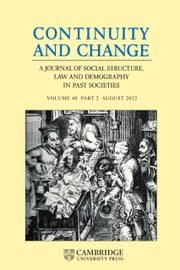Article contents
Rights and wrongs in the confinement of the mentally incapable in eighteenth-century Scotland
Published online by Cambridge University Press: 11 February 2004
Abstract
Improper confinement of those alleged to be mentally troubled was a prominent issue for the literate and propertied classes of eighteenth-century England and one which has fascinated historians too. In contrast, Scots did not perceive wrongful incarceration of the mentally disabled to be a serious social or legal issue. This article seeks to explain the differences between Scotland and England by focusing on a case where the care of a mentally troubled person was fought over. The article explores the familial settings and relationships involved in the care of the mad and idiotic and it shows medical and lay understandings of mental incapacity. Finally, it gives insights into the eclectic medical regime used to treat the mentally troubled and into the relationship between law, medicine and society. The argument is that different legal and medical structures meant that Scots were much less exercised about wrongful confinement. The article concludes that respect for the transparency of Scottish courts, for their cheapness and for their relative speed helped prevent the development of any extensive critique of improper confinement in eighteenth-century Scotland. Coupled with this was the relative power of the family compared with that of medical practitioners in Scotland.
- Type
- Research Article
- Information
- Copyright
- © 2003 Cambridge University Press
- 2
- Cited by


